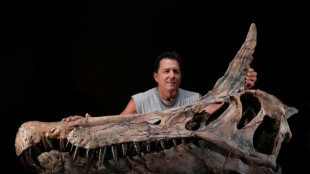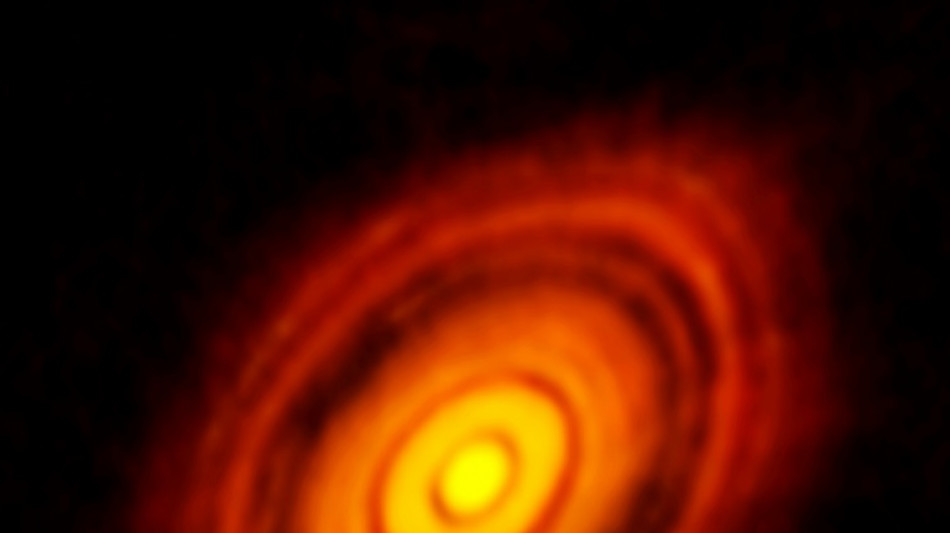
-
 Kerr says only '85 percent' fit for Women's Asian Cup
Kerr says only '85 percent' fit for Women's Asian Cup
-
Messi's Inter Miami to visit White House: US media

-
 Thunder beat Nuggets in overtime on Gilgeous-Alexander's return
Thunder beat Nuggets in overtime on Gilgeous-Alexander's return
-
'It's surreal': Zimbabwe superfans revel in unexpected ride to India

-
 New 'Wuthering Heights' film unleashes fresh wave of Bronte-mania
New 'Wuthering Heights' film unleashes fresh wave of Bronte-mania
-
US backs Pakistan's 'right to defend itself' after strikes on Afghanistan

-
 Bezzecchi beats Marquez to pole at season-opening Thailand MotoGP
Bezzecchi beats Marquez to pole at season-opening Thailand MotoGP
-
OpenAI strikes Pentagon deal with 'safeguards' as Trump dumps Anthropic

-
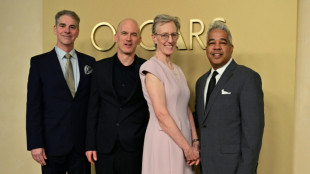 Oscar-nominated 'F1' sound engineers recreate roar of racetrack
Oscar-nominated 'F1' sound engineers recreate roar of racetrack
-
15 dead as cash-packed military plane crashes in Bolivia

-
 Costa Rica's Grynspan pledges reform in bid for UN chief job
Costa Rica's Grynspan pledges reform in bid for UN chief job
-
Former All Black Bridge hailed for influence at Western Force

-
 'Sinners' vampires inspired by animals, says Oscar hopeful makeup artist
'Sinners' vampires inspired by animals, says Oscar hopeful makeup artist
-
For Oscar nominee Stellan Skarsgard, good cinema is like slow food
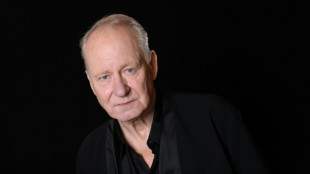
-
 'Brilliant industry' sees Reds down Highlanders in Super Rugby
'Brilliant industry' sees Reds down Highlanders in Super Rugby
-
Neil Sedaka, US singer and songwriter, dies age 86

-
 Paramount acquires Warner Bros. in $110 bn mega-merger
Paramount acquires Warner Bros. in $110 bn mega-merger
-
Rosenior eyes extended stay to stabilise Chelsea

-
 Spurs struggling physically admits Tudor
Spurs struggling physically admits Tudor
-
Lens held by Strasbourg in blow to Ligue 1 title chances

-
 NFL salary cap passes $300 mn for first time
NFL salary cap passes $300 mn for first time
-
Wolves secure rare win to dent Villa's bid for Champions League place

-
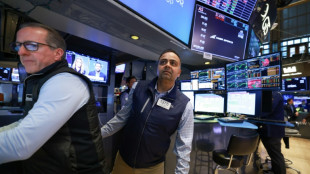 Oil prices jump on Iran attack fears while US stocks fall
Oil prices jump on Iran attack fears while US stocks fall
-
Two dead, dozens injured as tram derails in Milan

-
 Trump tells US govt to 'immediately' stop using Anthropic AI tech
Trump tells US govt to 'immediately' stop using Anthropic AI tech
-
Court orders Greenpeace to pay $345 mn to US oil pipeline company

-
 IAEA stresses 'urgency' to verify Iran's nuclear material
IAEA stresses 'urgency' to verify Iran's nuclear material
-
UN urges action to prevent full civil war in South Sudan

-
 Hackers steal medical details of 15 million in France
Hackers steal medical details of 15 million in France
-
Susan Sarandon praises Spain’s stance on Gaza

-
 Murray adamant size isn't everything despite losing Wales place
Murray adamant size isn't everything despite losing Wales place
-
Messi knocked down by fan in Puerto Rico pitch invasion

-
 Two killed, dozens injured as tram derails in Milan
Two killed, dozens injured as tram derails in Milan
-
O'Neill taken aback by Rangers boss Rohl's comments on Celtic

-
 Ukrainian, Slovak leaders hold call amid energy spat
Ukrainian, Slovak leaders hold call amid energy spat
-
French hard-left firebrand sparks row with 'antisemitic' Epstein jibe

-
 Ahmed, Jacks blast England to thrilling win over New Zealand
Ahmed, Jacks blast England to thrilling win over New Zealand
-
UK police arrest man after Churchill statue sprayed with graffiti

-
 Bill Clinton denies wrongdoing at grilling on Epstein ties
Bill Clinton denies wrongdoing at grilling on Epstein ties
-
Red Cross urges Afghanistan-Pakistan 'de-escalation'

-
 Coup role revelations revive calls for return of Spain's ex king
Coup role revelations revive calls for return of Spain's ex king
-
Oil prices jump on Iran attack fears, Wall Street slips on AI
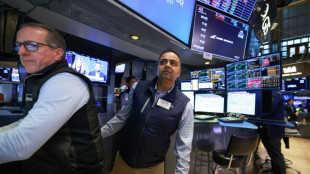
-
 TikTok disinformation: the other weapon in Mexico violence
TikTok disinformation: the other weapon in Mexico violence
-
Carmaker BMW to trial humanoid robots at German factory

-
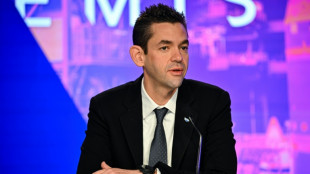 NASA announces overhaul of Artemis lunar program amid technical delays
NASA announces overhaul of Artemis lunar program amid technical delays
-
Golfer Pavan undergoes surgery after freak lift fall

-
 Bill Clinton faces grilling on extensive ties to Epstein
Bill Clinton faces grilling on extensive ties to Epstein
-
For Roberto Cavalli designer, dreams come in all black

-
 Macron to set out how France's nuclear arms could protect Europe
Macron to set out how France's nuclear arms could protect Europe
-
Spin-heavy England restrict New Zealand to 159-7 in Super Eights


James Webb telescope discovers its first exoplanet
The James Webb Space Telescope has discovered its first exoplanet, astronomers said Wednesday, capturing rare direct images of the relatively small world in the Earth's galactic backyard.
The telescope, which can see farther into the universe than anything before it, has turbocharged the search for planets beyond the Solar System since coming online in 2022.
Until now, however, its deep gaze has mostly been used to probe already known exoplanets -- to find out key information such as the atmospheric composition -- rather than tracking down new worlds.
The discovery of exoplanet TWA 7b, revealed in a study in the journal Nature, "represents a first for the telescope", France's CNRS research centre said in a statement.
The large majority of the nearly 6,000 exoplanets found so far have been identified from the light they blot out when they pass in front of their star, rather than from direct images of the planet.
Webb "has spent an enormous amount of time observing planets that have never been directly imaged," lead study author Anne-Marie Lagrange of the Paris Observatory told AFP.
- 'Blinded by the light' -
Capturing direct images of faraway planets is difficult because they are "very faint" due to a lack of heat, Lagrange said. Even worse, she added, "we're blinded by the light of the star they orbit."
But Webb has a way to get around the problem.
An attachment to Webb's MIRI instrument called a coronagraph masks the star, creating an effect similar to a solar eclipse. The telescope's infrared vision can then peer through and spot the planet.
Astronomers pointed Webb at the star TWA 7, which is around a hundred light years from Earth -- relatively nearby in the universe.
The star, which was first spotted by the Hubble space telescope in 1999, was thought to be a promising target for two reasons.
It is just 6.4 million years old -- a baby compared to the Sun's 4.5 billion years -- and still surrounded by a massive disc of gas and dust where planets are thought to form.
And from the direction of Earth, the disc is seen from above, giving a good view of its rings.
The three rings around the star, which stretch more than 100 times the distance separating the Sun and Earth, had previously been spotted by the Very Large Telescope in Chile.
But inside an otherwise empty section of the second ring, the Webb telescope detected something particularly bright.
Astronomers ruled out that the light was coming from an object at the edge of the Solar System, or from a distant galaxy behind the star.
That could mean only that the light source was a relatively small and cold planet, with a mass at least 10 times lighter than any other exoplanet directly imaged so far, according to the study.
- The hunt for smaller worlds -
The researchers estimated that the planet's mass was similar to that of Saturn, a gas giant that weighs only a third of Jupiter, the biggest planet in the Solar System.
Webb has increased the ability to detect exoplanets via direct images by a factor of 10, Lagrange said.
That is important because smaller, rocky planets similar to Earth or Mars are the ultimate target in the search for habitable worlds outside of the Solar System.
Lagrange said she would be delighted to discover "Earth-like planets" one day.
But she said astronomers needed to study all kinds of planets -- and to understand how planetary systems form -- to know whether the life-hosting Solar System is unique.
In the future, astronomers expect the Webb telescope will be able to spot planets even smaller than TWA 7b.
But directly capturing images of faraway worlds similar to Earth will require even more telescopic power, such as from he Extremely Large Telescope that is scheduled to come online in Chile in 2028.
P.Costa--AMWN
